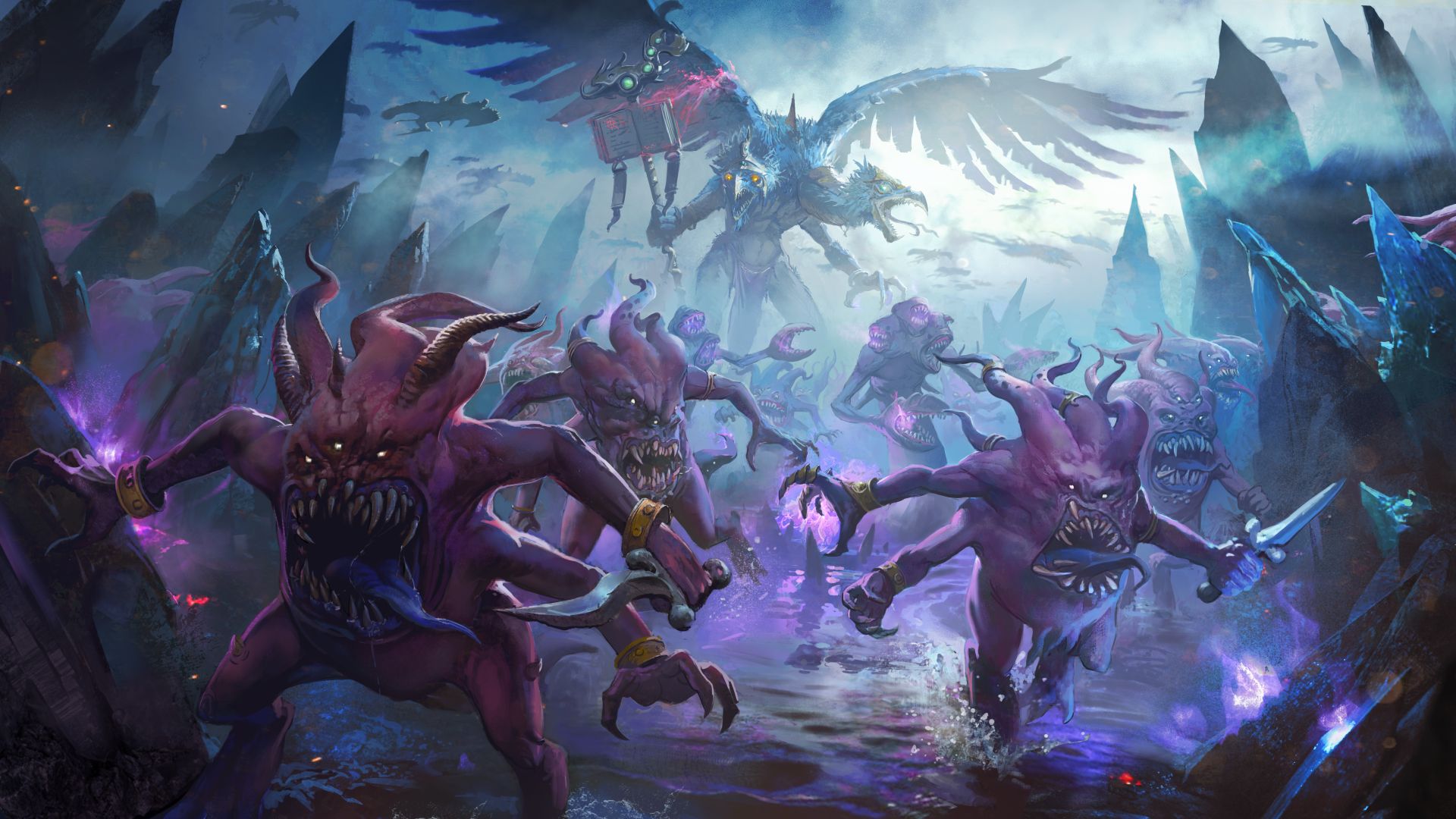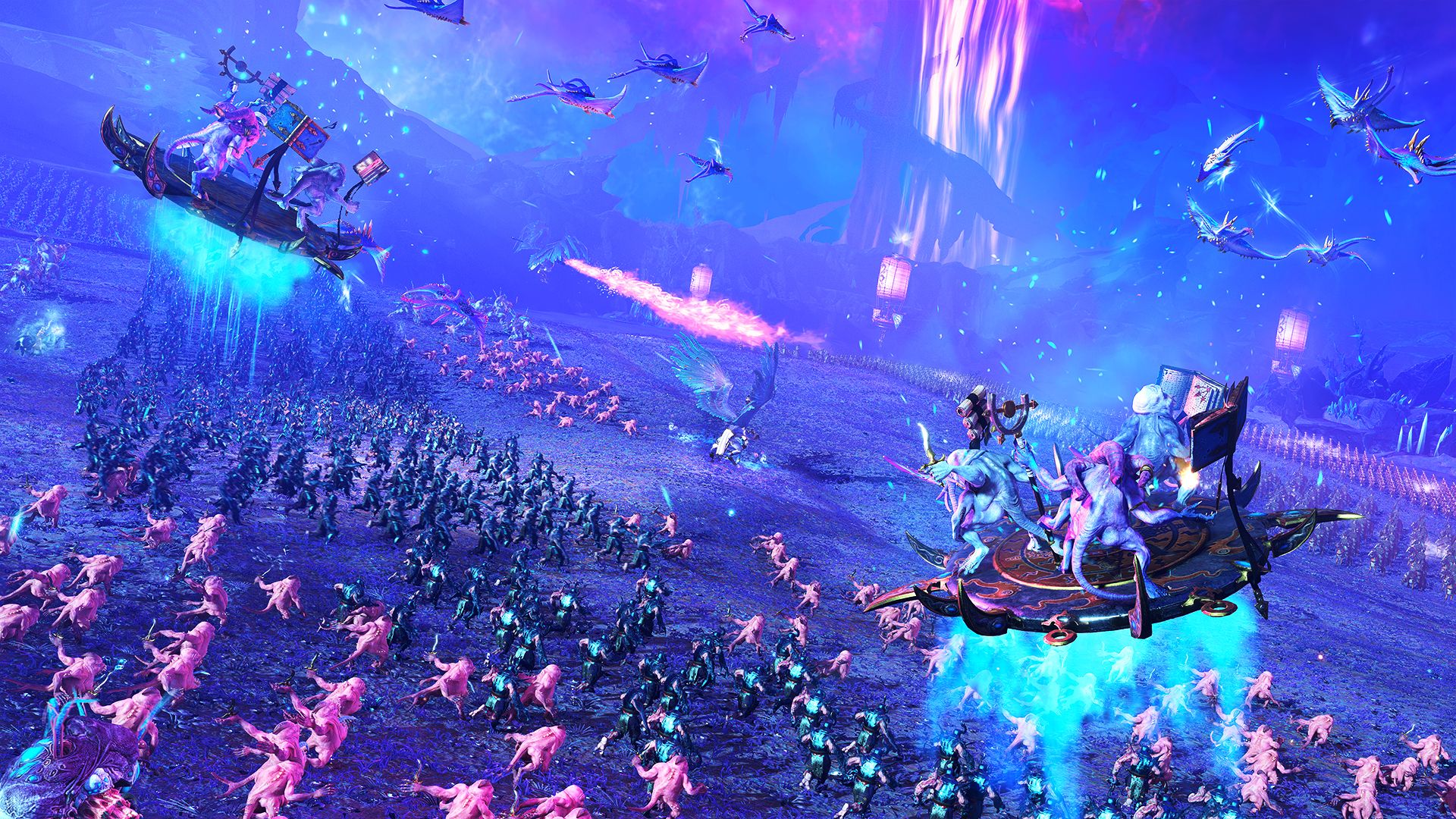Meet the mystical bird-lovers of Warhammer’s Tzeentch army

To do Tzeentch justice, this entry in the Tome of Knowledge would just be an endless list of names and aspects and abstract concepts. It’d be 99,999 words long, most of which would be lies. And it would be out of date the second you started reading it.
Tzeentch is the Great Deceiver, the Changer of Ways, the Chaos God of Magic. He’s the lord of ambition, knowledge, betrayal, and hope, and his multiplicity makes him almost unknowable. No two descriptions of Tzeentch are alike. ‘Horrid magic bird’ is perhaps the only form our fragile human mind can take.
To follow Tzeentch is to court incredible possibilities at a dangerous cost, without ever really knowing if you’re doing your job properly. While his Chaos brothers have direct, often simple goals, such as spilling blood in the case of Khorne or spilling literally any bodily fluid in the case of Slaanesh, Tzeentch is unknowable by design. In that respect, it’s like working for a nuclear power plant without an induction. You have great power at your fingertips. And you probably won’t know you’ve messed up until the mutations appear.

(Image credit: Sega)
We’ve partnered up with Sega to create The Tome of Knowledge, a series of articles and videos that showcase the flavour, personality and units of Total War: Warhammer 3’s factions.
So why would anyone worship Tzeentch, then? That’s much simpler: for gain. Of all the Chaos gods, he’s the one who can offer the sort of meaningful change mortals crave. He’s alarmingly likely to answer your prayers, since Tzeentch is fascinated with mankind. But unlike the attentive, fatherly Nurgle, Tzeentch sees mortals as playthings—distracting insects he can manipulate into devouring each other. Tzeentch is intrigued by our capacity for deceit, ambiguity, and contradiction. Ambition and impatience are his tools, and insecure mortals, desperate for power, might mouth silent prayers to the Lord of Change without ever realising at what cost his promises come.
Tzeentch is the master of intricate plans and empty promises, so, as you might expect, he has a specific interest in the Great Game of Chaos. As an inveterate schemer Tzeentch regards the other Ruinous Powers as little more than a means to achieve his inscrutable ends. He’ll ally with them when the need arrives and betray them the second their usefulness expires. Tzeentch sees Slaanesh as sinister and self-indulgent and Khorne as an unsophisticated fool. But his true contempt is for Nurgle, god of disease and decay. Tzeentch thrives on hope and ambition—the mortal desire to control things. But Nurgle is a god of slow decline, who encourages his followers to embrace despair. They are energy versus entropy, germination versus deterioration, and because of this they’ll only work together in the most unusual circumstances. And, even then, only when Tzeentch wills it.

(Image credit: Sega)
As you’d expect from the Great Deceiver, many of Tzeentch’s plans happen on the campaign map, where you can exchange grimoires you’ve collected on something called the Changing of the Ways: a unique mechanic that lets you track armies, break alliances, and transfer settlements between factions. On the battlefield, Tzeentch’s forces reflect his unpredictability: an explosion of colour and energy that demonstrates mastery over magic, incredible manoeuvrability, and devastating ranged attacks.
At the head of you’ll often find an Exalted Lord of Change, the Greater Daemon of Tzeentch. These are vicious melee combatants in their own right, but they truly excel at spellcasting. And the most powerful of them all is Kairos Fateweaver, the faction’s Legendary Lord. His right head sees the future, with all its infinite possibilities. And his left head the past, but without the influence of perspective or bias. But, in a very Tzeentchy way, this comes at a cost: he’s unable to see anything happening in the present.
Tzeentch’s rank-and-file troops are anything but simple. Horrors scamper into battle, spewing eldritch flame as they go: sullen and malicious if they’re blue, sprightly and squealing if they’re pink. Doom Knights, mounted flying Discs of Tzeentch, careen into the enemy lines, sacrificing defence for devastating speed and power. And the skies are darkened by Screamers, glimmering sky-sharks that glide along the winds of magic, preying on the souls of mortals like daemonic apex predators. Even Tzeentch’s artillery is arcane: Flamers bounce along upon fiery skirts, hurling bolts of pure Chaos energy at foes that don’t just burn them, but actually warp reality. Normal fire looks like an own-brand supermarket projectile by comparison. Their low ammunition means they’ll usually end up in melee combat, but used effectively there’s unlikely to be anyone left for you to fight.
A Tzeentch army in full flow is a terrifying, kaleidoscope thing to behold. They’re manoeuvrable, resilient, and impactful, and with the sort of offensive spells that make Khorne angry and confused, like an old man using a self service checkout
And, on the off chance things go wrong, Tzeentch is the only faction where you can pretend losing was part of your grand plan.

